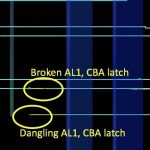Back in college my roommates figured out that the TV cable coax wire was still connected to our apartment. As a result, I was able to watch the Richard Pryor movie Silver Streak about 30 times without a cable box, however the screen was partially jumbled from the simple content protection used back then. This was possible by aggressively… Read More
Author: Tom Simon
We Need Libraries – Lots of Libraries
It was inevitable that machine learning (ML) would come to EDA. In fact, it has already been here a while in Solido’s variation tools. Now it has found an even more compelling application – library characterization. Just as ML has radically transformed other computational arenas; it looks like it will be extremely disruptive here… Read More
It’s Time to Stop Thinking in Two Dimensions
The first transistor was made of two electrodes, held in place by plastic, making contact with a piece of doped germanium. Ever since then, devices and their packaging have been performing a complicated and oftentimes intricate dance. Single transistor devices became integrated circuits, and along the way separate IC’s were… Read More
How Far Has Design Automation Brought Us?
It’s always a struggle explaining electronic design automation (EDA) to people who ask me what field I am in. I have come up with simple and minimal descriptions – such as “software used for designing semiconductors.” This, of course, does little to provide any useful understanding to people who are not familiar with the field.… Read More
Making Cars Smarter And Safer
The news media has naturally focused on the handful of deaths that have occurred while auto-pilot features have been enabled. In reality, automobile deaths are occurring at a lower rate now than ever. In 2014 the rate was 1.08 deaths per 100 million miles driven. Compare that to the 5.06 per 100M miles in 1960, or a whopping 24.09 in… Read More
Calibre Can Calculate Chip Yields Correlated to Compromised SRAM Cells
It seems like I have written a lot about SRAM lately. Let’s face it SRAM is important – it often represents large percentages of the area on SOC’s. As such, SRAM yield plays a major role in determining overall chip yields. SRAM is vulnerable to defect related failures, which unlike variation effects are not Gaussian in nature. Fabrication… Read More
When Once is Not Enough, But Unlimited is Too Much
When people think about non volatile memory, the first thing that usually comes to mind is NAND flash like that used in SSD’s or in microcontrollers to hold on-board code. Of course, there is also EEPROM and other types of NVM as well that can be used to hold data and code for the multitude of connected devices that are so common now. For… Read More
When is "off" not really off?
With the old fashioned on-off power switch came certainty of power consumption levels. This was fine back in the days before processor controlled appliances and devices. On was on and off was off: full current or no current. With the first personal computers you always had to wait for the boot process to complete before you could … Read More
Who knew designing PLL’s was so complicated?
Well it comes as no surprise to those that use and design them, that PLL’s are a world unto themselves and very complicated indeed. With PLL’s we are talking about analog designs that rely on ring oscillators or LC tanks. They are needed on legacy nodes, like the ones that IoT chips are based on, and they are crucial for high speed advanced… Read More
SRAM Optimization Saves Power on SOC’s and in Systems
Mobile device designers face the dilemma of reducing power and at the same time maintaining or increasing performance. Consumers will not tolerate increased battery life at the expense of performance. If it were otherwise, designers could simply dial back clock rates. Without this simple cure, the best way to reduce power for… Read More
















TSMC Process Simplification for Advanced Nodes